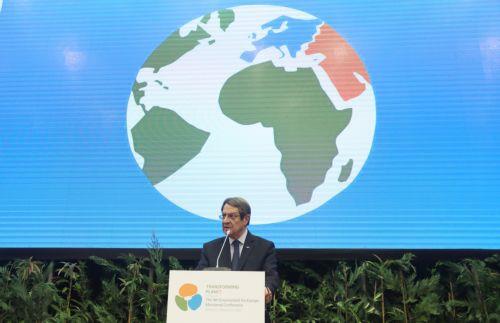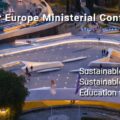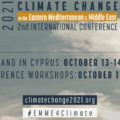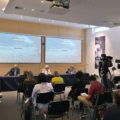(Report by Evie Andreou of Cyprus News Agency)
President of Cyprus Nicos Anastasiades said on Wednesday that the need to take effective decisions and to implement substantial measures and policies to secure the planet’s sustainability is becoming more urgent.
Addressing the 9th UNECE Ninth Environment for Europe Ministerial Conference underway in Nicosia, the President said it is a highly important meeting for sustainable environmental development, with its declarations expected to become a point of reference to formulate national policies for the participating countries.
The UNECE meeting, he said is a special honour for Cyprus as it is the first time that it is taking place in the Mediterranean, one of the most vulnerable regions affected by climate change.
Because of the critical times, there is an urgency to take effective decisions and to adopt and implement substantial measures and policies whereby the sustainability of the planet will be secured, President Anastasiades said.
He added that the discussion and analysis of the conclusions from the plenary sessions of the meeting and making use of the knowledge and experiences of the distinguished personalities who are participating “are especially significant to find viable solutions and the best practices to protect the environment.”
Referring to the meeting, he said the three policy documents and the Ministerial declaration that are expected to be adopted at the end will determine the guidelines that will draw up additional actions and policies to be implemented at national, European and international levels, strengthening efforts for sustainable development.
Referring to the actions of the Republic of Cyprus, President Anastasiades said that in order to immediately address the challenges the state is facing, the Republic of Cyprus’ priority is the formulation and adoption of a cohesive and holistic environmental policy.
The main aim, he added, is to protect the biodiversity, reduce the impact of pollution on public health and ecosystems, adopt principles of circular economy, the correct management of our natural resources and the effective contribution in handling climate change.
President Anastasiades said that 41% of the budget, through the National Recovery and Resilience Plan, concerns reforms and actions estimated at more than 500 million euros for transition to Green Economy and climate neutrality.
In addition, he said projects for green growth totalling 350 million euros are included in the EU structural funds for the period 2021- 2027.
“At the same time, further to our plans and strategies at a national level, Cyprus actively participates and undertakes initiatives and actions, at international and regional levels regarding the treatment of global environmental and energy issues,” he said.
He reminded that Cyprus has undertaken the presidency of the United Nations Commission on Sustainable Development. He also pointed out Cyprus’ initiative in relation to the Mediterranean Strategy for Education for Sustainable Development which was adopted in 2016 by all Mediterranean countries.
At this point, President Anastasiades praised the fact that the 3rd Joint High-Level Meeting of Ministers of Education and Environment on Education for Sustainable Development will convene in Nicosia. The meeting will discuss the four main axes of the new UNECE ESD Strategy implementation framework 2021-2030 and the future steps for its implementation.
The President said this is the most tangible, most urgent and most ambitious proof of the “constructive role we want to play for the protection of the environment, it is the initiative we have undertaken to handle the climate crisis in the wider region of the Eastern Mediterranean and the Middle East“.
In her keynote address, United Nations Under-Secretary-General and Executive Secretary of the United Nations Economic Commission for Europe (UNECE), Olga Algayerova, referred to the need for cooperation to achieve the goals of the Conference. She said today’s Ministerial Conference is the ninth since the Environment for Europe process began 31 years ago, when the political map of the region “was quite different”. She said the Environment for Europe process began in the region still sharply divided along social, economic, and political lines, with the vision and hope of contributing to healing these divisions, “and it succeeded”, by offering countries a forum for closer regional cooperation on environmental issues it delivered important products and outcomes.
She greeted the delegates from Europe, Asia, Africa, and America, “who have come to cooperate with us today” and thanked the people and the Government of Cyprus, for hosting the event and everyone who worked for its organisation.
Deputy Executive Director of UNEP, Sonja Leighton-Kone, in her opening remarks referred to Zeno of Citium, and his teachings about “living in agreement with Nature”.
“We have failed to heed these sage words. Almost everywhere we look humanity is out of balance with the living world,” she said, adding that “catastrophic impacts and unprecedented suffering lie ahead unless we act now.”
Even in Europe, she said, “one of the most advanced regions on Earth, progress in addressing the crisis is patchy.” Kone said that the Mediterranean and Black Seas are overfished, while pollution and waste are still rising, forests are still disappearing and fossil fuels still make up 78% of the energy mix, driving climactic change that is drying up the region’s rivers, making it harder to grow food, and fueling devastating wildfires and heatwaves.
She said that this conference will also focus on infrastructure and tourism, “rightly so as both play a major role in addressing the interlinked crises threatening the region”. Kone also stressed the importance of collaboration between different government ministries to find solutions on how infrastructure is built, limiting the harm to the environment and to public health, strengthening resilience and boosting the economy.
Raphaela Miltiadous, who spoke on behalf of the youth of Cyprus, said that an accident she had three years ago that left her a paraplegic in her lower limbs made her realise that “everything can change“.
In her own message, she said that she is not an environmental expert but experiences climate change like everyone else. She said that there are no longer four seasons, and spoke about the need for everyone to take responsibility for saving the planet, which is, as she said, our home.
“We have to act decisively and with more courage,” said Miltiadous, noting that there will be a cost that will have to be borne by all.
Addressing the representatives of the various countries and organizations, she said that their responsibility is to set the rules and the framework so that the burden is distributed equally, and to oversee the implementation of the decisions by the governments.



